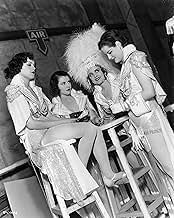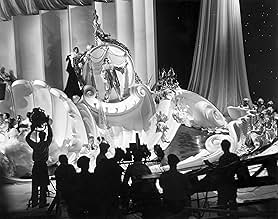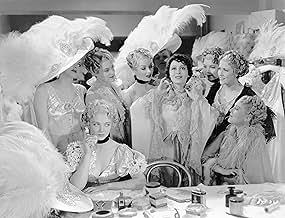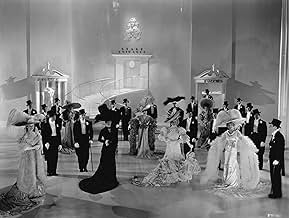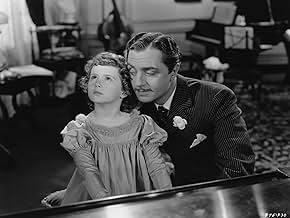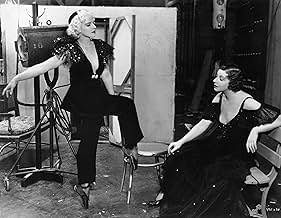Aggiungi una trama nella tua linguaThe ups and downs of Florenz Ziegfeld Jr., famed producer of extravagant stage revues, are portrayed.The ups and downs of Florenz Ziegfeld Jr., famed producer of extravagant stage revues, are portrayed.The ups and downs of Florenz Ziegfeld Jr., famed producer of extravagant stage revues, are portrayed.
- Vincitore di 3 Oscar
- 8 vittorie e 5 candidature totali
- Fannie Brice
- (as Fannie Brice)
- Dr. Ziegfeld
- (as Joseph Cawthorne)
Recensioni in evidenza
It's a spectacle made in the grand Old Hollywood fashion, heavy on melodrama and lavish musical numbers. Powell is fine in the lead. I have no idea how closely he "gets" Ziegfeld here, as he seems very much like William Powell's usual screen persona to me. He would reprise his role as Ziegfeld a decade later in 1946's Ziegfeld Follies (also from MGM). Luise Rainer is terrific in her Oscar-winning role as Ziegfeld's first wife, Anna. Myrna Loy is a little miscast as Billie Burke but it's hard to argue against any opportunity to see Powell and Loy on screen together. The rest of the cast includes solid supporting players Frank Morgan, Virginia Bruce, Ray Bolger, Reginald Owen, and Nat Pendleton. A. A. Trimble does a spot-on impersonation of Will Rogers.
It is a bit overlong. The first half could have done with some trimming. Still, a fine cast keeps things interesting and those musical numbers are dynamite. Dennis Morgan's "A Pretty Girl is Like a Melody" number is one of the highlights. The film was nominated for seven Academy Awards with three wins, including Best Picture and Best Actress for Rainer. Its award wins are the subject of debate for some today, who argue it is one of the least-deserving Best Picture winners. That's kind of laughable when you think about it, as the Best Picture Oscar rarely goes to the most deserving film. That was true then and is even more true today, in my opinion. It's definitely something you'll want to try out if you are a fan of classic Hollywood and all its glitz and glamour. They don't make 'em like this anymore.
Florenz Ziegfield was one of the most brilliant producers of this country at the end of the 19th and beginning of the 20th centuries. He had an eye for what worked on a stage. He was also the discoverer of a lot of the talent that went to have enormous careers of their own, long after they appeared in one of Mr. Ziegfeld's extravaganzas.
Robert Z. Leonard in directing this film had a lot of contributors, no doubt, but it's probably Adrian, the costume designer par excellence that gave this movie a lot of class by recreating for the screen some of the costumes that were associated with Ziegfeld.
William Powell portrays the great Ziegfeld. Mr. Powell is amazing in his interpretation of the creative man on the screen. He is this man he is playing on the screen; he is totally convincing he was born to play the role.
Actually the film leaves a lot of things unexplained. We know that Anna Held is out of the picture, after her divorce, but nothing is mentioned that she had died at all. Also, the relationship with his second wife, Billie Burke, comes as an afterthought since she only appears in the last part of the movie.
Luise Ranier made a compelling Anna Held, the French actress, who obviously never understood her husband, even though it's clear she loved him. She appears as a complete insecure person, never knowing what to do, or what to decide on. As far as the Oscar she won for playing this role, it eludes my comprehension, or maybe that year her competition must have been poor.
Myrna Loy as Billie Burke gives a radiant performance. She was always a convincing actress and in the film she demonstrates her versatility in playing a musical comedy star. The young Myrna Loy was a gorgeous creature, as proven in this film.
The costumes from some of the musical numbers are incredible. Of course, they were made to suit the theatricality of whatever Mr. Ziegfeld presented. Such extravagant numbers will never be presented on a Broadway stage ever again as the cost would be prohibitive.
Virginia Bruce, Frank Morgan, Ray Bolger, Fanny Brice appear in the film, but of course, the picture is dominated by William Powell from beginning to end.
The Great Ziegfeld agreed is overlong with a draggy and at times uneventful first half and half an hour could easily have been trimmed. And more could have done with the relationship between Ziegfeld and Billie Burke which appeared late in the film and didn't feel developed enough, almost like an afterthought.
However, The Great Ziegfeld is very lavishly mounted, with photography that's both beautiful and clever, sumptuous costume design and some of the most handsomely gorgeous sets of any 30s musical. Other pleasures are the marvellous and very well-staged(without being too overblown) songs with A Pretty Girl is Like a Melody being an absolute show-stopper, a script peppered with humour and heart and the mostly poignant story. Standout scenes were Fanny Brice's charming My Man, Ray Bolger's witty dancing to My Follies Girl, Luise Rainer's heart-breaking telephone(justifiably famous) and especially A Pretty Girl is Like a Melody with its clever photography and perhaps one of the best uses of a staircase in a film. The direction is adept and the performances are great, with William Powell suave personified and especially Luise Rainer who is the epitome of charm and grace, capable of a good range of emotions as seen in the telephone scene. Fanny Brice, Frank Morgan, Ray Bolger are all memorable, while Myrna Loy is underused she's hardly wasted either.
Overall, a well-made, entertaining and very good film and well worth the look. 8/10 Bethany Cox
Oscars Best Picture Winners, Ranked
Oscars Best Picture Winners, Ranked
Lo sapevi?
- QuizA.A. Trimble, who portrays Will Rogers in the film, was a Cleveland map salesman who frequently impersonated Rogers at Rotarian lunches.
- BlooperIn the "Rhapsody in Blue" portion of the mammoth "Pretty Girl" number, one of the silver-fringe-and-antlers quartet of dancers gets visibly disoriented when her group does its final moves. She's the second one from the left, and her movements are completely out of sync with the other three until, with a thump, she sits down on the stairs. Since the incredibly complex number was shot in very long takes, the error was allowed to remain in the film.
- Citazioni
Florenz Ziegfeld Jr.: [after catching Ray Bolger doing a little softshoe backstage] Buddy, you're better with your feet than you are with your broom.
Ray Bolger: Mr. Ziegfeld, you think so? Gee, I wish you'd give me a chance. I've got talent, and I'd like to get away from shifting scenery and moving props.
Florenz Ziegfeld Jr.: How long have you been a property boy?
Ray Bolger: Five years, but my heart hasn't been in it.
Florenz Ziegfeld Jr.: You've been working a long time without your heart, buddy.
- Curiosità sui creditiThe opening credits display the title of the film and the names of the stars in marquee lights, as they would be on Broadway.
- Versioni alternativeThere is an Italian edition of this film, as Bonus Extra, on DVD "FOLLIE DI ZIEGFELD", re-edited with the contribution of film historian Riccardo Cusin. This version is also available for streaming on some platforms.
- ConnessioniEdited into Le fanciulle delle follie (1941)
- Colonne sonoreHarriet Hoctor Ballet
(1936) (uncredited)
(also called "A Circus Must Be Different in a Ziegfield Show")
Music by Con Conrad
Lyrics by Herb Magidson
Sung and danced by male and female choruses
Danced by Harriet Hoctor
I più visti
- How long is The Great Ziegfeld?Powered by Alexa
Dettagli
- Tempo di esecuzione2 ore 56 minuti
- Colore
- Proporzioni
- 1.37 : 1
Contribuisci a questa pagina



